#FFVII Rebirth Ultimania
Text

Quick phone screenshot of model art for Galian Beast from the FFVII Rebirth Ultimania ❤️
(Will try to see if I can do a better quality photo / scan at some point)
((Edit: For the folks in the comments/tags acknowledging that even his Galian Beast form is sexy, you are correct and valid ❤️ ))
#vincent valentine#ffvii rebirth#ffvii rebirth spoilers#galian beast#concept art#ffvii rebirth ultimania
371 notes
·
View notes
Text
Cut for FFVII Remake/Rebirth and Sliding Doors spoilers and length.
So the FFVIIR Ultimania pretty much confirms that we’re dealing with the multiverse. I’m loving it, too, because I love the multiverse in fiction.
There are two types of multiverse in fiction that I’m familiar with. The first is the most common one, I find. In this one, the other universe or several other universes have always existed alongside the “prime” universe. This is the multiverse that’s seen on Fringe and in the Marvelverse, among other places. Travel between universes isn't often possible unless a machine or special ability is used.
There’s also a version that doesn’t appear quite as often at least in my experience, and that’s one where a new universe is created by a point of divergence. This could be a spawned universe in which an event has the opposite outcome (character dies in the prime universe, creating one where they lived; character makes choice #1 which spawns a universe where they make choice #2 instead). There’s a hypothesis in the real world about something like this called the quantum multiverse, but I’m nowhere near being a theoretical physicist so I’ll stop talking about that now.
When this plot device is in play, the terms "alternate universe" and "alternate timeline" are sometimes used interchangeably. In the latter, the point of divergence is someone going back in time and changing something and a new timeline is spawned where things progress differently and can lead to a different outcome, which is a good way in fiction to avoid temporal paradoxes. Even though the multiple timelines exist in a single universe, I can see how they can become universes unto themselves, so the interchangeability makes sense.
One example of this second type is the movie Sliding Doors, at least to my eye. Helen misses the train then gets mugged and goes home to her cheating boyfriend none the wiser and her life goes on as usual. This is the point of divergence, because it creates a universe where she catches the train, gets home in time to catch her boyfriend in bed with his side piece and begins a whole new life as a result. From what I remember from the movie (it's been a minute since I've seen it), both Helens have some sort of low-level awareness of each other.
It’s made pretty clear in Rebirth that we’re dealing with this second type. Zack dying in the prime universe is the point of divergence that creates a universe where he lives. Him choosing to confront Hojo about a cure for Cloud is the point of divergence that spawns a universe in which he chooses to go to Biggs instead. Cloud and Aerith not becoming the official couple in the prime universe is the point of divergence that spawns the universe where they do. Cloud not getting to the altar in the Forgotten Capital in time to stop Sephiroth is the point of divergence that spawns a universe in which he does get there in time and disarms him, and we see both things happening at once. There’s also the implication that Sephiroth slashing Tifa but not killing her is the point of divergence that spawns a universe where he slashes and does kill her.
That’s what we’ve seen so far. We’ve also seen things that make me wonder about how they’re telling the story. There’s a poster of Yorkie!Stamp in what we assume is the prime universe, where we’ve seen that Stamp is a beagle. Cloud and Aerith’s antics as a couple appear to take place in the same universe where he’s still in a mako coma. Sephiroth somehow has time to both unite the multiverse in the prime one while pursuing the Black Materia and engage in political intrigue and beat the war drum for Wutai by impersonating Glenn and trolling the holy hell out of Rufus.
What if they’re showing the story progressing across multiple universes and doing it so seamlessly that we don’t know whose story is being told in which one? Right now we have Cloud as the protagonist in the Beagleverse and Zack as the deuteragonist in the Yorkieverse, or so we think. What if we’re seeing multiple stories playing out across multiple universes with multiple versions the main characters? That’s a pretty bold storytelling choice if that’s what they’re up to. So far it seems we’re dealing with about 5 or 6 universes. Wow. If so, maybe this story should have been called Everything, Everywhere, All At Once if the movie hadn’t gotten to that title first.
And Sephiroth seems to be the Big Bad in all of them, because the points of divergence all occurred after the Nibelheim incident.
But speaking of those points of divergence…
If there were those that occurred after the Nibelheim incident, there would be ones that occurred before it as well, wouldn’t there? There are strong hints that one of these points was Sephiroth succumbing to Jenova after torching Nibelheim and carving up Tifa, which could have created a universe where he didn’t succumb (hence the retention of the Ore pronoun in Japanese). This is assuming, of course, that this version of Sephiroth is not one of Cloud’s hallucinations. I have more to say about this part, but that’s another manifesto for another day.
It follows that there would also be universes where the point of divergence was the Nibelheim incident. Could this have spawned a universe where he doesn’t torch the town? You would think so. What other outcomes could there be? Would he pack up and go back to Midgar to force the truth out of Hojo? Would he resolve to destroy Shinra instead?
Would he maybe follow through on his desertion plans, head to Wutai and make plans with Old Man Shinra to resume the war while taking on the appearance of his now-deceased childhood brother figure who just happened to foment a coup in Wutai and become a pretty prominent figure in its interim government? Hm…would he, now? Is this how he preserves the life of the planet? By duping the old man and later Rufus into buying into the destruction of Shinra without even realizing it?
The scenes between Glenniroth and Rufus could possibly take place in a universe where that last scenario could have played out without the destruction of Nibelheim in the mix.
Going back to the idea that we’re viewing multiple universes all at once. We see the main party infiltrating the ranks, and Captain Cloud is leading his troops through the parade in the prime universe. All in pursuit of saving the world from Big Bad Scary Evil Man Sephiroth.
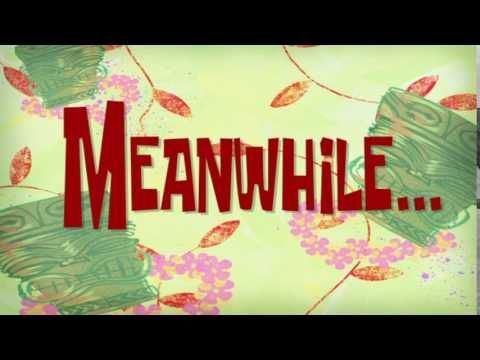
In another universe, Sephiroth-As-Glenn is meeting with Rufus, presenting his war plan and giving him shit about being an idle trust fund baby. In this universe, Cloud is marching in the parade as a regular old trooper, Nibelheim still stands and Tifa is probably contemplating getting the hell out of Dodge because my god, that place sounds like Betty Friedan’s worst nightmare.
See where I’m going with this? I hope so because I’m not sure I do.
Anyway, it seems that at least two versions of Sephiroth are able to access a space in between the universes and pull others into it as well (Edge of Creation). How he does this is not made clear, and we know little to nothing about the version Cloud meets there at the end of Remake and the Rebirth Ultimania doesn't seem to add more to that story.
There’s also the possibility that Jenova’s plan to unite the multiverse is already underway and what we’re seeing with the way the story is told is all of the universes bleeding together. That would probably be easier to pull off than my last suggestion, but I hope the last one is the case because I want to see how well they can pull it off.
The lack of clarification in the Ultimania about the different versions of Sephiroth or why things seem to be happening that shouldn’t be happening is-I hope-avoidance of spoilers in order to set up some big reveals in Part 3 and not them just losing the plot big time and writing by the seats of their pants. Making a big deal out of a character then just abandoning said character and their storyline is an amateur hour move expected from novice fanfic writers still growing into their craft, not professionals with 30+ years of experience. I'm going to put my faith in Kitase and his team and say that they just don't want to ruin any surprises.
That’s all I’ve got for now. And I acknowledge that I’m inconsistent with my speculation. If you’ve been following along, you know that I change my mind more than the day changes to night. That’s the beauty of this story: the more you think about it, the more you rub your chin and think “hm, maybe THIS happened instead of THAT.” And then an Ultimania here and a dozen interviews there comes along and says “NOPE. It’s that third or fourth other thing we just came up with.”
Anyway, thank you for indulging me if you chose to stick around for the whole thing. Take care and enjoy the rest of your day or night!
#FFVIIR Spoilers#FF7R spoilers#Sephiroth#Cloud Strife#Tifa Lockhart#FFVII Rebirth Ultimania#Multiverse
8 notes
·
View notes
Text
FFVII Rebirth players: So is Aerith alive or dead?
FFVII Rebirth Ultimania: lol
3 notes
·
View notes
Text
FF7 Rebirth Ultimania - Mini Vincent Bio

https://x.com/aitaikimochi/status/1778701268686651539
A small snippet of Vincent's biography has been translated from the very recent Rebirth Ultimania. While much of it isn't new per se, there is a small bit that I wanted to focus on as it is a small change from OG.
'Sleeps a lot because he wants to suppress the monsters within him'
For anyone familiar with Vincent's who initial characterization in OG, it should make your brow raise. The whole reason why he chose to sleep in his coffin was to atone for his sins which is what Vincent has been memed for for many years. However, in Rebirth, we don't get any such hint of that within the main story. The only bit of regret we learn about is with his past with Sephiroth and not being able to kill him. However, at least according to the Ultimania, Vincent's past sins are not the reason for his slumber... but rather to suppress his monsters. This is new.
While it was always eluded to, this isn't Vincent's original reasoning. It seems like Square is leaning very heavily into Vincent's monsters, aka the single glowing eye, how Barret calls him a freak (he says 'monster' in Japanese) upon immediate transformation, Galian Beast as a boss, Vincent becoming uncomfortable when Barret scoffs at the idea of monsters having feelings, etc.
My guess is that SE is going to characterize Vincent having a lot of fear of himself and his lack of control over his demons (which again was hinted at in various compilations but casual fans would never have known this). And seeing as there seems to be a mysterious connection between Sephiroth and the whole theme of monsters, it could be that Vincent is also afraid of becoming what Sephiroth has already become-- a merciless killer. This would make sense as to why Vincent is so resistant to joining Cloud and Co, not only due to whatever happened between him and Sephiroth, but also fearing himself and how he believes he is a monster. I could see this also playing into Vincent keeping himself distant from the party in part 3; not only because he doesn't want to get close to anyone (so as to not get emotionally hurt), but he may be terrified of losing control of his monsters and harming those he cares about.
198 notes
·
View notes
Text
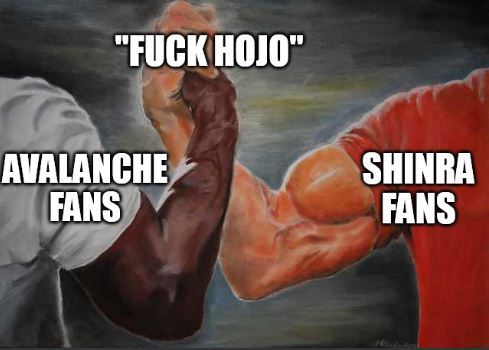
The one thing the entire fandom can agree upon.
#final fantasy vii#ffvii#ffvii rebirth#final fantasy vii rebirth#shinra#avalanche#crisis core#advent children#dirge of cerberus#professor hojo#epic handshake meme#I'm waiting for that one gadfly in the comments to be like “achshuelly Hojo didn't do anything wrong if you check page 371 of Ultimania...”
32 notes
·
View notes
Text
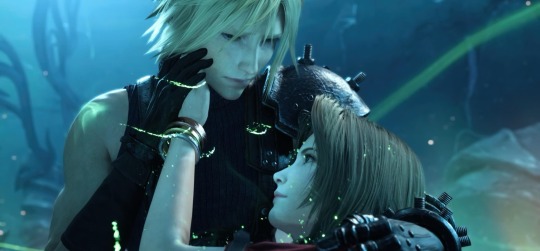
FFVII Rebirth Ultimania:
Nojima & Toriyama confirm the lines you can’t hear Cloud say during Aerith’s death are these exact lines from the original FFVII:
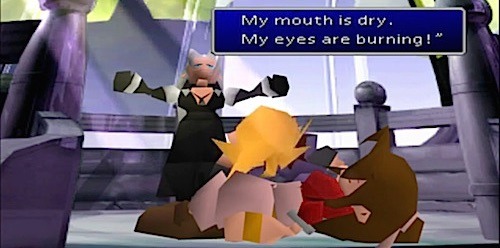
104 notes
·
View notes
Text
CANON DATE FFVII REBIRTH (only for those who support Aerith) - no flames
Dont like dont read, dont start a war
I make this video below, took couple of days to finish it. I want to know if Tifa is canon, but no. AERITH is the one who is always canon.
Reason:
- FFVII Rebirth Ultimania, check it out guys! In Tifa section, the canon image showed they hugged NOT kiss. Also Nojima stated that not all dates have connection to canon story
- Rosa is always Aerith in Aerith, Barret, Red XIII, even Cid Cait Sith Vincent's date
- NPTK is for cloud. Regardless what Nojima or creator said, in NPTK Aerith date she looks at Cloud last time after singing to show that the song is for him. Why isnt she doing the same in other dates if NPTK is for all party members/plural?
- At Aerith's date NPTK song, she looks at cloud atleast 3 times. Other NPTK song, at the end she never looked at cloud and others. But cloud date is
- Her date is the only one whose connected to story after and only makes sense if they dated.
- The petals in NPTK flew, and only in her date it landed on Cloud
- Barret and Red XIII also mentioned about Aerith in their skywheel date. Many said that Barret talked about Tifa, but for Aerith it makes the most sense since hes going to lose her
- Rosa role is for Aerith, look at her staff and princess demeanor. Cait said that shes indomitable princess, the same phrase also in their costa del sol date
- No promises in LOVELESS is mirror to NPTK, makes no sense if Tifa and Yuffie is the one in it
- Alphreid protected Rosa is a mirror to Cloud and Aerith, no one else (he never protected Yuffie that way, also Tifa?) Also Rosa rescued Alphreid is a mirror to Clouds sentence: She rescue me, I rescue her, and on and on it goes or something like that
- Alphreid Cloud & Rosa Aerith is Jessie & Guy in Blue cape of loveless. See the hair resemblance?
Need to add more? 😂
youtube
#clerith#need to be fuming in shipping war#why they tell NPTK IS ABOUT ZACKK???#the truth about date#cloud x aerith#dont want start war with other shippers beside clerith
59 notes
·
View notes
Note
i’m about a month late to the ffvii rebirth fanfare but i saw your study/shot comparison for the ending while scrolling through some tags and was really curious to see if you had come up with any more conclusions since then! i just finished it a couple days ago and still reeling from it and have been enjoying hearing people’s thoughts about what the heck they think is going on. obvs cloud is not ok, but i’m still trying to decide just how much of what we’re seeing is due to his sanity going out the window and how much of it (if any) is aerith actually speaking to him and/or sephiroth messing with him. the way he tells the rest of the party to not look up at the sky though and none of them see what he sees, just clues them all in to the fact that he isn’t entirely all there anymore. a collective very concerned side-eye lol. somebody help him pls.
!!! oh friend, you're in a TON of luck: I actually started a few different commentaries on how I saw the ending on this weeks back, but didn't post them because I got distracted by other fandoms? I'm more than happy to share them though—not as developed as they could be, but some congealing of where my mind went upon finishing the game and rewatching the gameplay.
forewarning: FFVII ending spoilers + a long af post lmao
So I wrote this on my twitter (where I go to see things only on twt lol) the other day because of a bunch of concepts were clarified by the Ultimania + translators, which kinda sums up where my thoughts are:
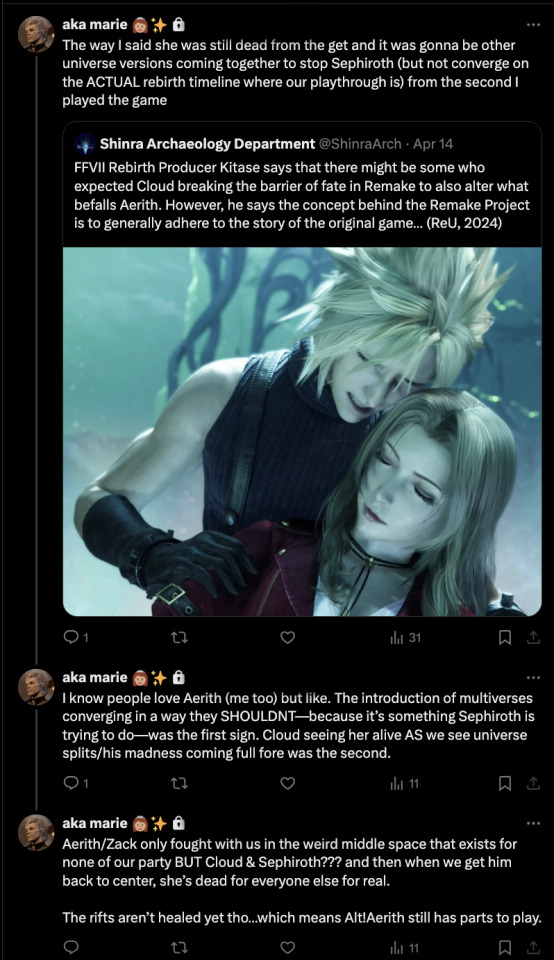
Which...yeah. As I see it: as of the ending, Aerith is in fact dead in our current world (the one of the player narrative). How I see it, she's died in our primary timeline—though likely "alive" in the same way Zack is in some other timeline, in addition to her connection to every "universe" through the power of her connection to the planet as the last Cetra.
The white whispers (which represent Aerith/the will of the planet) as well as the “confluence of world” colors we see with Sephiroth are all around when Cloud supposedly “sees her alive" during the classic death scene—
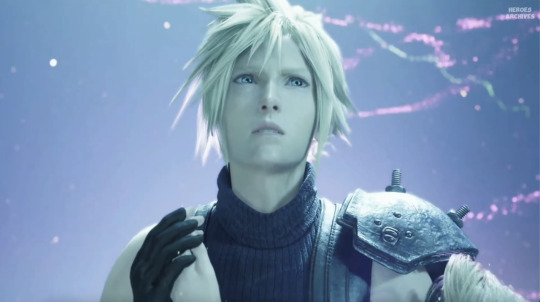

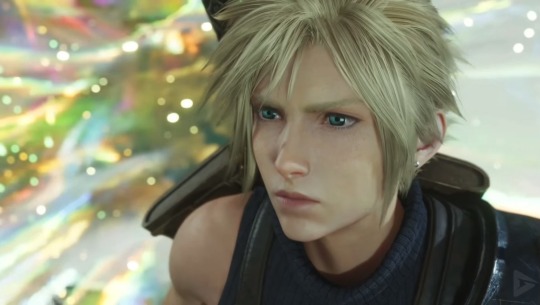
—an indicator that the event itself was the "confluence" Sephiroth was trying to achieve, with Cloud experiencing several versions of it due to his own connection to Sephiroth/the lifestream/his fragmented mind. We see this both in what Sephiroth says around the event itself....and also the contrasting experiences of our party with what Cloud sees in the moment (+ through end of the game).
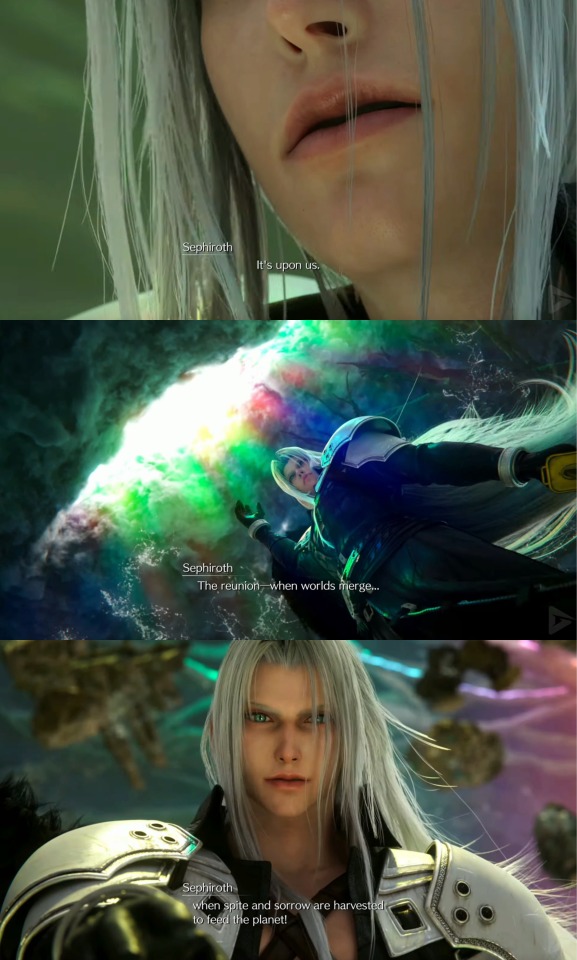

As I see it, Cloud’s consciousness by the end of FFVII:R-II is fully fractured; throughout both Remake & Rebirth he is already seeing visions affected by Sephiroth’s influence on the planet (the black whispers, the way hooded men and thin air turn into Sephiroth before his eyes)—and now, during the “confluence of emotions / worlds / reunion” mentioned (Aerith's death), Cloud’s already broken mind is slipping further into seeing “the middle space” of the worlds joined and prepared for destruction by Sephiroth in real time, rather than following the timeline of events in the world we play—a la the post that inspired your ask. :)
All that said: the reason he’s seeing Aerith (not just sensing her the way Red does in his own Lifestream connection) is because she’s a Cetra, and now (in death) the embodiment of the positive!Will of Gaia across worlds—so because of Cloud's connection to that "middle space" / ability to traverse different versions of reality because of his connection to Sephiroth, Cloud is interacting with her presence…despite it not being there for anyone else.
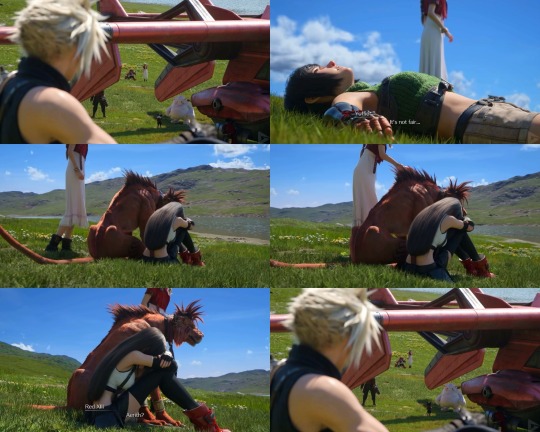
It’s also why he can see the sky split no one else can.
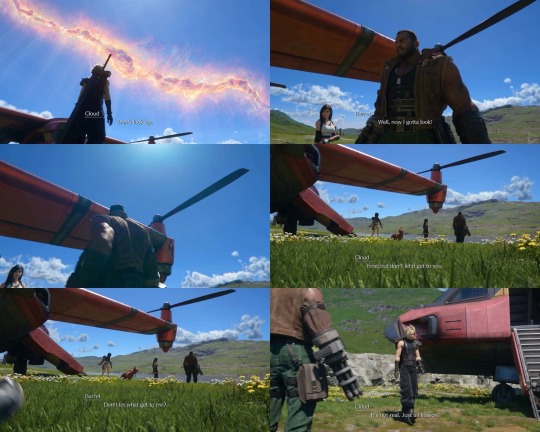
ADDITIONALLY:
The Aerith we see fight alongside Cloud in the final battle and the one we see walking around everyone as Cid fixes the plane…that’s the spirit of her person (think the Aerith of Advent Children). Aerith didn’t live this game—her spirit can communicate because of Sephiroth's successful confluence, though she’s ALSO "alive" in the same way Zack and Biggs are to us: aka she died in the world she was in but still exists in others, which Sephiroth confirms/explains both when Aerith pulls Cloud into another “doomed” world—

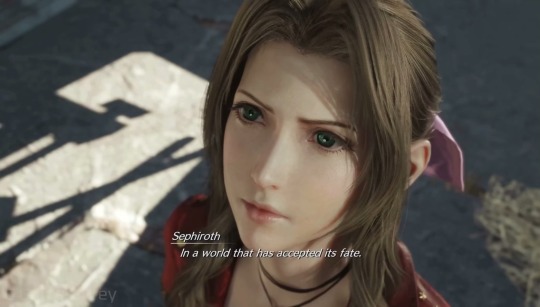
when he’s trying to manipulate Cloud in the Lifestream—

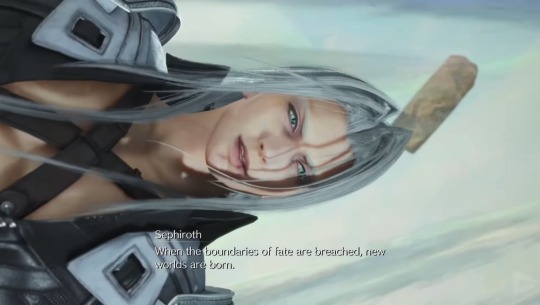


and when you’re fighting Sephiroth alongside Aerith in the void during the final battle (after she’s died).
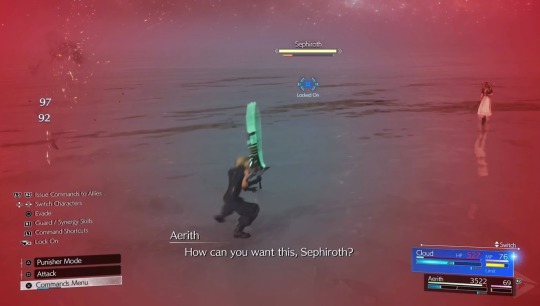
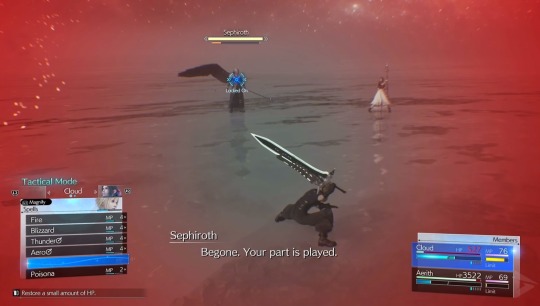
Even so, Aerith “living on” as the last Cetra/the spirit of the planet + someone with access to multiple worlds through the "reunion" means she’s now as able to infiltrate Cloud's ongoing visions as Sephiroth is...and is likely trying to keep him even somewhat present despite his clearly fractured mind.
I think that’s implied repeatedly by through the hollow Holy Materia (implying both Aerith is no longer “there,” but still present + that cloud himself is now hollow)—

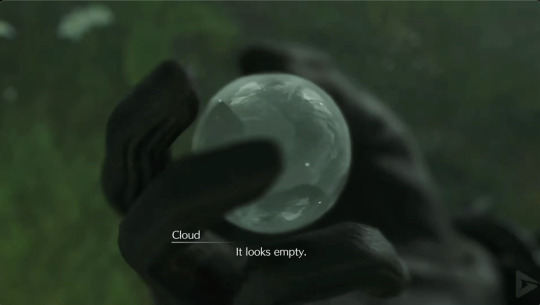



—and why/how the Black Materia (Sephiroth) is still manipulating him and very much driving his fractured thoughts, visions and actions.
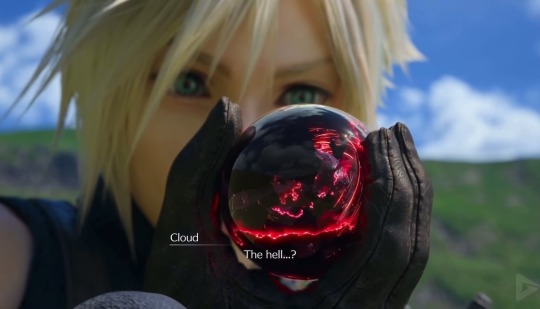
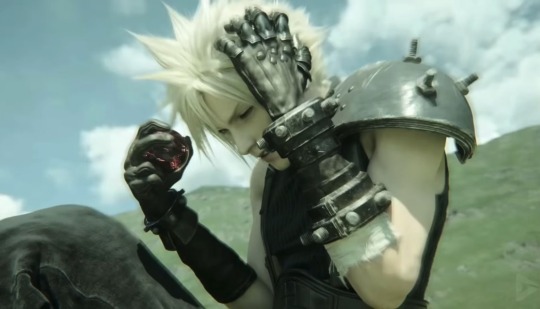
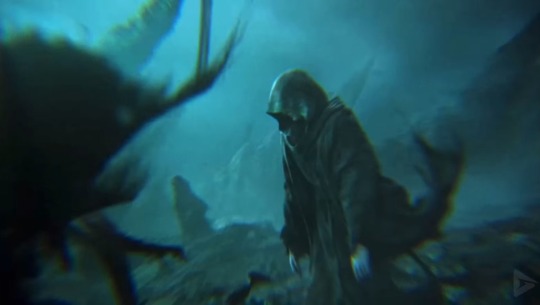
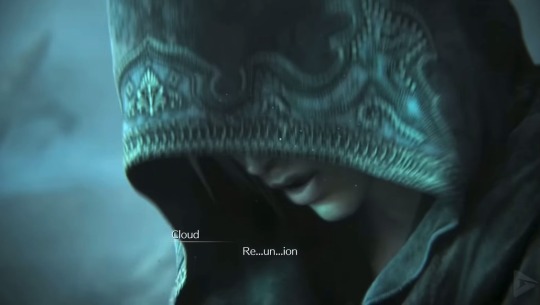

As for the rest of the party: it's because no one but his “vessel-connected-to-Sephiroth” self (+ now dead-but-living-on-in-the-Lifestream Aerith) has any idea what he learned about worlds in the Lifestream that what’s happening to Cloud is lost on everyone (and why they look painfully concerned), and also why spirit!Aerith repeatedly gives him reminders to 1) not listen to Sephiroth and 2) focus on finding himself again.
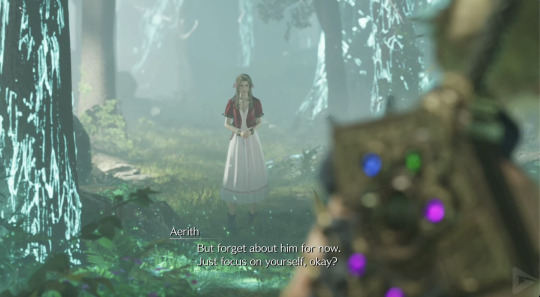
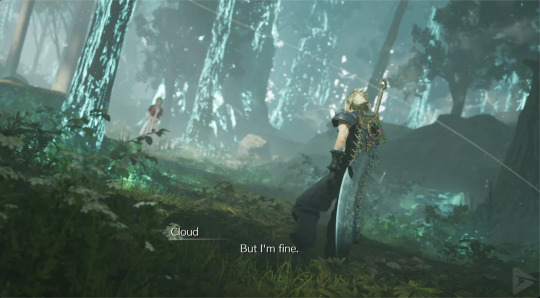

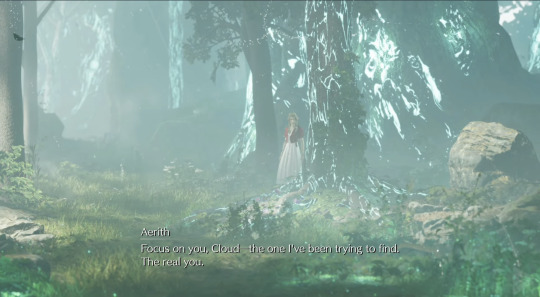
All that said: because Cloud’s actual self is already slipping away from our present game TL by the second half of the game, it will have to be retrieved and rearranged—which we know will happen in game 3 (assuming you know the original FF7 plot where Tifa rearranges him in the Lifesteam) but that has to be changed from “Cloud finds out about Zack and finally cracks" because Cloud already knows about Zack in some capacity by the middle of Rebirth.
I personally think this sets us up for a really interesting resolution in that Tifa is going to probably have spirit!Aerith’s help putting Cloud back together in the Lifestream in game 3—and that she will likely play a bigger part in helping Cloud “find himself” in his own world again because it’s been made more apparent that she’s a full consciousness in the Lifestream/able to affect multiple worlds now because of Sephiroth completing the first step in his plan. That's more just hopeful on my part going into the next game than something rooted in analysis though.
But yes! those are my thoughts! I hope this gives you (more than a little) something. Feel free to ask if something isn’t clear though lol this was like 4 different half-done drafts combined 😂 Regardless, ty so much for the ask / giving me a reason to post them!
#I hope this made even one (1) iota of sense. I can clarify in a full post later if you'd like because this was a lot of bits and bobs LOL#still. its been made clear by Nomura and Co she is no longer with us at least in THIS world#and context clues as to when cloud sees her + the streak in the sky + the visions of sephiroth etc...his connection to Sephiroth#through Mako/SOLDIER/something similar to the Sephiclones is why he's out here going THROUGH IT#as Sephiroth converges the world. at least in MY reading#cloud strife#aerith gainsborough#sephiroth#ffvii analysis#ffvii spoilers#ffvii:r spoilers#ffvii#final fantasy#the me tag#asks
21 notes
·
View notes
Note
“The FFVII Rebirth Ultimania is now less than a week away! We plan to cover this guidebook as swiftly and accurately as possible, prioritizing full translations of the developer interviews and secrets section, followed by character profiles, keywords, and other lore-heavy content.”
From the bird app ^
What are you looking forward to find out more about Alto?
I'll be keeping an eye out for anything that's juicy. If you guys find something, please let me know.
Main points of Sephcanon interest:
Anything said about Sane!Sephiroth
Sephiroth and Cloud's intended dynamic
Whatever the hell is going on between Sephiroth and Vincent
Any mentions of Genesis
Whatever the hell is going on with Glenn
20 notes
·
View notes
Text
About Tifa's 'Censorship' in Final Fantasy VII Remake & Rebirth...
So, recently, I found out that in Final Fantasy VII Remake & Rebirth, Square 'censored' Tifa by putting a black shirt under her crop top.

And lots of FFVII fans are mad about it. Here are some of those comments...
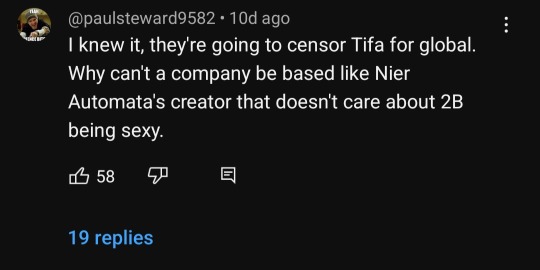
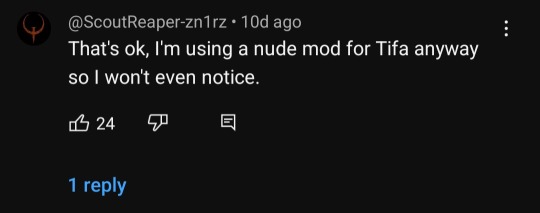


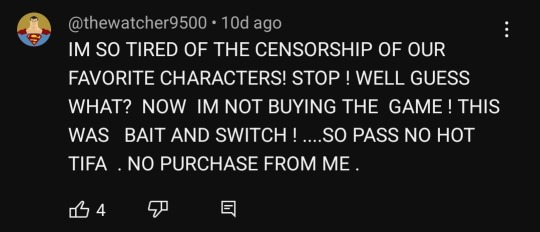


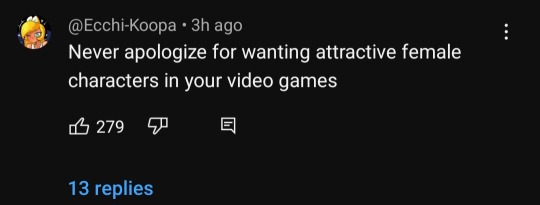
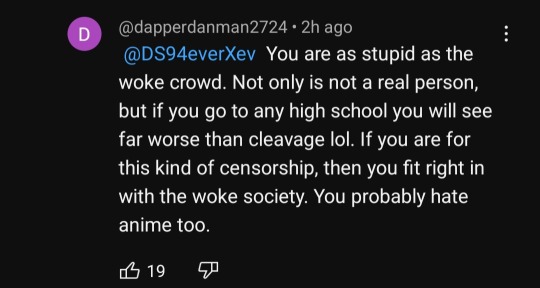

The Nibelheim Incident, the part where they 'censored' her, took place 5 years before the start of VII. At the start of VII, according to the Remake Material Ultimania, she is 20 years old. This means that, during the Nibelheim Incident/The Tragedy of Five Years Ago, Tifa's age is: 20 - 5 = 15 years old. 15 ≠ 18. This is also mentioned in her character profile from the Crisis Core Ultimania. Nobody wants her to be a teenager in that scene. She IS a teen. It's in the math. And it's in the canon timeline.
Your 'fan service waifu' was 15 years old at that point in the game. A high schooler. A CHILD. A MINOR.
While she is a fictional character, the fact that all of you are so DESPERATE to see a 15-year-old's cleavage and are boycotting the game over a black undershirt is really telling of how y'all are in real life.
They're not censoring adult Tifa. They didn't put her in a beekeeping suit at Costa Del Sol in Rebirth, did they? No, they put her in a bikini. Simp over adult Tifa. Not teenage Tifa.
Important Links:
youtube
youtube
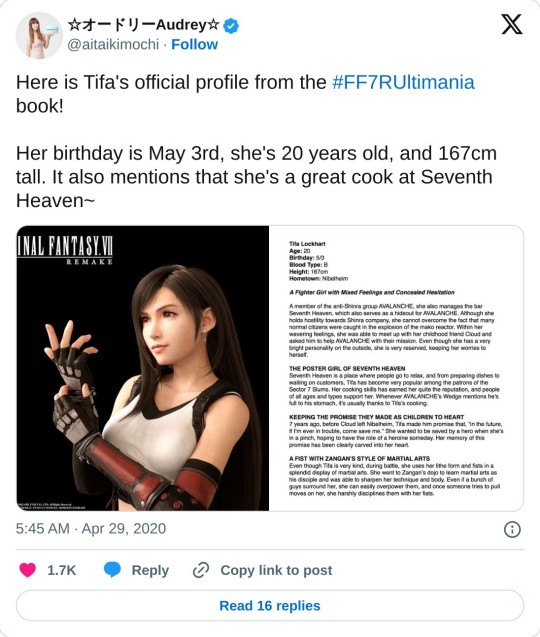
#tifa lockhart#square enix#crisis core reunion#final fantsy vii#final fantasy vii remake#final fantasy vii rebirth#nibelheim incident#ff7#ff7 remake#ff7 rebirth#ff7r#Youtube#crisis core#material ultimania#protect minors
15 notes
·
View notes
Text
Tifa's Theme: A Musical Deep Dive (Part IV)
Parts I-III here.
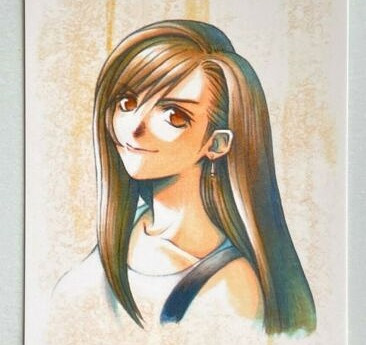
Section (D) Tifa’s Leitmotif Across the Original FFVII
(D) (I) The Leitmotif as Setup and Foreshadowing
Tifa’s leitmotif is heard just twice in the original game. The first time – in Tifa’s Theme – it loops over four crucial back-to-back story events:
Cloud and Tifa’s (first shown) reunion in Seventh Heaven;
Cloud and Barret’s argument in Seventh Heaven’s basement;
Cloud and Tifa’s recollection of their promise; and
Cloud agreeing to join Avalanche on the next bombing run.
Tifa’s Theme begins before Tifa welcomes Cloud “home”; before Marlene mistakes his arrival for her “Papa’s;” before anything at all is said about her. The music is the game’s first statement about Tifa.
As well as introducing the character and what she represents, Tifa’s Theme communicates the subtexts of the Cloud and Tifa’s bond:
The ‘reunion’ foreshadows their reunion in the Lifestream where their arcs climax;
The argument (with Barret) establishes Cloud as having no ties to any person, affiliation or cause but Tifa;
Cloud’s promise to protect Tifa is the memory tying their past together;
And Cloud joins Avalanche to keep their promise.
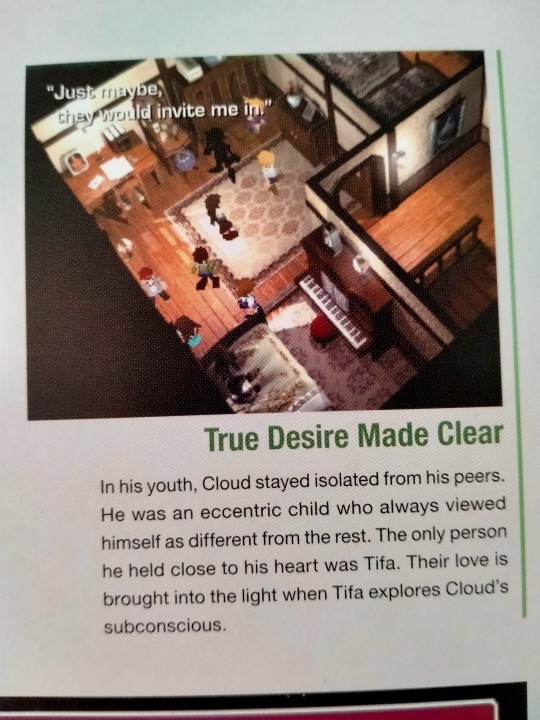
Screenshot from Cloud’s profile in Final Fantasy Ultimania Archive Vol. 2.
The second time the leitmotif is heard is in the track, The Planet’s Crisis: the conclusion of Cloud and Tifa’s arcs. Before that, however, there is a melody directly connected to the leitmotif, and that is in the high flute segment of Words Drowned by Fireworks.
(Which I will call WDBF for short.)
(D) (II) The Leitmotif as Echo and Resolution
For decades now, players have debated which Gold Saucer outing is ‘the most’ canon. That they occur as substitutes for one another means they are all canon (and hoo boy, would that bromance with Barret be a glorious addition to Rebirth.) But the accompanying music track on these outings pertains to one duo very specifically. And that is in its subtle relationship to Tifa’s leitmotif melody. I am not talking about the instrumentation here – the flute not being solely unique to Tifa (it is used heavily, for instance, in Aerith and Nanaki’s leitmotifs). Nor am I referring to the track’s title – which is a homage specifically to Cloud and Tifa’s date (her words are the only words to be drowned by fireworks). No, there is a treasure here which undoubtedly gives the track away as belonging to Cloud and Tifa. And that is the pitch-for-pitch nine-note bridge to each melody’s climax (WDBF and Tifa’s Theme).
If we were to transpose one melody into the key of the other, this segment would be identical in pitch. In Tifa’s Theme this bridge is the ending of Subphrase 3. In WDBF, this bridge is the ending of the flute-role.
Here is our segment from Tifa’s Theme in its original key of F major (untransposed):
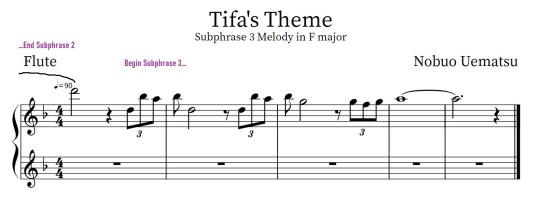
Transposed into the key of G major – the key of WDBF – we have:
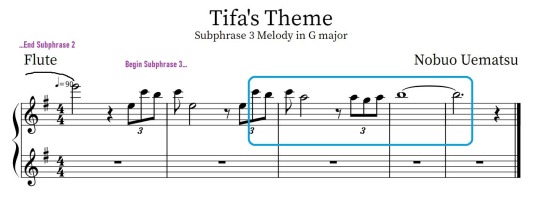
This section circled in blue is echoed in WDBF, in the exact same place where the bridge takes us into the climax.
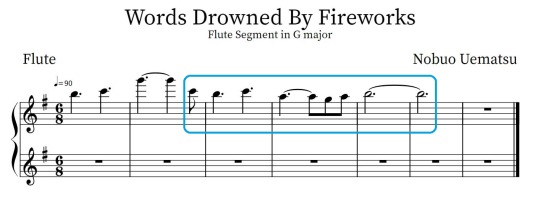
Here is our quick comparison of this section in the original keys, and transposed key (Tifa’s Theme in the key of WDBF):
youtube
The effect of this subtle echo is huge. Recall from our last post that Subphrase 3 of Tifa’s leitmotif culminates on a held A – the note she had been trying to rise to again and again since its beginning…

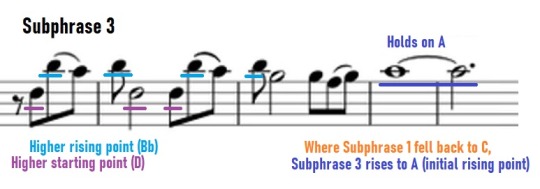
…And ending on that initial rising point, we were taken into the climax (Subphrase 4) which ultimately ended a tone below that A (our G meaning Tifa just missed the mark).
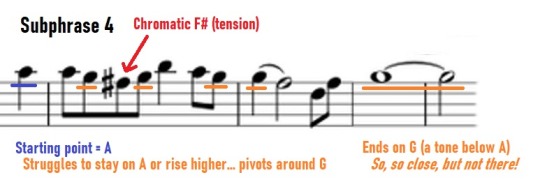
Now, with the pitch-for-pitch echo of that bridge signaling the climax-point of WDBF, we have Tifa literally, openly, trying to express her yearning love for Cloud. This note-step echo, so to speak, presents her direct, now unmistakable attempt. For while Tifa’s Theme culminates in a final struggle where Tifa locks her feelings away, WDBF bridges into the game’s main leitmotif – which is specifically, in its minor-keyed, ‘unstable’ rendition, the heart of the ‘finding-Cloud’ conflict.
WDBF does not only play at Gold Saucer. We hear it for a second time in the Temple of the Ancients when Cait Sith ‘predicts Cloud and Aerith’s future.’ Of course, by Disc 1’s end, this is revealed to be the narrative’s ruse – this conversation (metaphorically) being the drowning-out firework as Cait Sith says, “Poor Tifa.” The third and final time we encounter the track is when Tifa finds the comatose Cloud in Mideel, ending where she learns that he has mako poisoning and circumstances again keep him from her reach. This is her last ‘drowned’ expression of feelings – their next reunion (occurring with the main leitmotif in Who Am I?) being the real deal, where Tifa and Cloud together piece back their memories, recover Cloud, and Tifa learns of Cloud’s life-long devotion to her.
youtube
It has often been overlooked that Tifa has, at the point of Who Am I?’s first occurrence, lost her own semblance of self. I have rarely seen the subject of her own memories broached in discussion, which are, it must be emphasized, just as in need of resolution as Cloud’s. Noted in the video above, Who Am I? also applies directly to Tifa – its second occurrence being during her time in Scarlet’s gas chamber. (Forgive my error in the video – the track occurs three times and is first introduced through Cloud in the Temple of the Ancients.) Cloud, the anchor of her past and present, has been stripped away. Tifa doesn’t know what is real anymore, wondering whether her memories are “made up” (as she confesses later in the Lifestream). The life and home she’d rebuilt in Midgar is destroyed. And she is in a state of despair, having failed to keep Cloud safe. Tifa, simultaneous to losing Cloud, has lost herself, allegorized by her being strapped to a chair, alone in darkness, left to die under the fogged and suffocating fumes of the gas.
Moreover, this occurrence of Who Am I? bridges the two times that our brave and persevering heroine breaks down. The first, when Cloud hands over the Black Materia, where she is ready to die as North Crater crumbles. The second, on the Highwind, even after having fought for her life and escaping Scarlet’s chamber. Here, the party confronts her about Cloud and encourages her to push forward:
Nanaki: Do you think we aren’t strong enough without Cloud? Do you think we can’t save the Planet alone?
Tifa: Meteor is coming, and Weapon is on the rampage… At a time like this, I don’t know what I’m supposed to do. No idea at all…
Barret: Get a hold of yourself, Tifa! C’mon, let’s think about this! No way we can get offa this train we’re on!
Tifa: If only Cloud was here, everything would be fine. Cloud would… stand that cocky little way he did, and tell us what to do. He’d say, ‘Everything’s under control, Tifa.’
Barret: Tifa! When’d you become such a wimp!
Tifa: I’m sorry, Barret. I’m so depressed, I’m surprised at myself.
Nanaki: And Tifa… the reason why we all thought it was Cloud was because…
Tifa: I know. That’s why I want to make sure. That’s why I have to see him again.
Before turning to the game’s grand climax, The Planet’s Crisis, let us look at some instrumentation. The intro melody of Tifa’s Theme is played on a solo oboe, and harmonized by an electric piano and clarinet. This is interesting because, as we saw in the leitmotif and its echo in WDBF, Tifa’s voice is represented by the solo flute. Remember from Part III of our deep dive that the intro of Tifa’s Theme presented two collocating viewpoints (ours/Cloud’s, and Tifa’s) and that its ending tension (the dominant chord) took us for the first time directly into Tifa’s own viewpoint. We see the same thing happening with the instrumentation: the oboe – the flute’s neighbor relative instrument – playing the intro; and the flute then picking up her leitmotif. Flutes and oboes serve different kinds of roles all over FFVII. But in the context of Tifa’s Theme, two perspectives can be taken on the oboe:
The first, as representing both Tifa’s view and the views of everyone else for whom Tifa is ‘home.’ (The oboe presents Tifa’s view but it is clouded by her secrets, whereas the flute lifts us up into her true desires.) Because her secrets are only foreshadowed and locked away in this intro, we see the Tifa that Cloud and the party sees – we see her as home, distracted from her sufferings. Thus the two views collocate: Tifa’s and the party’s/player’s/Cloud’s.
The second, as foreshadowing Tifa and Cloud coming together – the oboe playing the climax (the game’s main leitmotif) which follows the flute (Tifa’s leitmotif echo) in WDBF, and the oboe later being Tifa’s voice (for Tifa’s full leitmotif) overlapping Cloud’s on the English horn in The Planet’s Crisis. (We’ll get to this shortly.)
While WDBF’s flute segment echoes Tifa’s Theme and climaxes with the heart and resolution of Tifa’s conflict – finding Cloud – it very, very closely resembles the instrumentation of the track Lifestream, as we’ll see in the video below. In terms of Tifa’s character arc, therefore, WDBF can be called the track that bridges Tifa’s Theme (her arc’s conflict) with the Lifestream itself (the physical setting of her arc’s resolution).
youtube
Finally, we have reached The Planet’s Crisis. Aside from WDBF’s little echo, Tifa’s leitmotif is hidden from the time of her introduction until the grand climax of the game. Why is this, from a musical-narrative standpoint? My conclusion is: to be the conveyance (together with FFVII’s main leitmotif) of the conclusion of Cloud and Tifa’s arcs. Here, at long, long last, the two leitmotifs overlap.
(D) (III) The Leitmotif as Conclusion
Cloud set off to join Soldier to gain the strength to protect Tifa, and his promise to be her hero continually drives his arc. It is during the Planet’s crisis that Cloud – free of Soldier and Sephiroth, as just Cloud – has finally carried this out. (Bear in mind the distinction between resolution and conclusion. Tifa’s arc resolved in the Lifestream with the saving of Cloud and her own sense of self. Cloud’s arc was there also resolved, with his regaining his psyche, his feelings being bared to Tifa, and his accepting of himself. The Planet’s crisis, following their night under Highwind, is the final carrying forward of that resolution. That is to say, it is the tying up of all ends – the conclusion. Cloud who has accepted himself – his ‘weak,’ ‘failure’ self who truly was Tifa’s hero and had her heart all along – is able to, just as himself, save her.
Let us consider this narrative now together with the music.
Firstly, a note on the key. When we began our deep dive, we began with a quote by Austrian composer Ernst Pauer, who summarized F major as:
“…at once full of peace and joy, but also express[ing] effectively a light, passing regret – a mournful, but not a deeply sorrowful feeling.”
D major, the key encompassing our segment of The Planet’s Crisis, Pauer summarizes as:
“…express[ing] majesty, grandeur, pomp, and adapt[ing] itself well to triumphal processions, festival marches, and pieces in which stateliness is the prevailing feature.”
D major is popularly used in marches, carols and holiday songs. Where Tifa’s Theme carries home along with underlying suffering, its leitmotif with the main in The Planet’s Crisis carries victory.
When Cloud has caught Tifa in the crumbling crater, we hear Tifa’s leitmotif on the oboe, solo over arco strings. Below is a screen from the orchestral partition, courtesy of Kevin Courcelle here (all thanks and credit to this amazing musician and arranger whom I highly recommend looking up).
This first subphrase plays over the pair holding each other and discussing reuniting with Aerith.
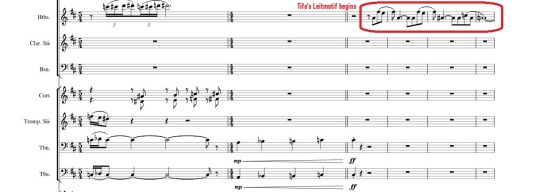
As the second subphrase ends, we have the overlap of the four-note ending of Sephiroth’s leitmotif, on the English horn (cor anglais) and trombone. This ending represents the vanquishment of Sephiroth’s influence in Tifa’s life; Cloud has at last defeated him once and for all. (Well, until Advent Children, but for our present original story…) This is conveyed in the merging of Sephiroth’s leitmotif into the main (through the same instrumentation), representing victorious hero-Cloud. The triumphant melody overlaps with the third and fourth subphrases of Tifa’s – Tifa’s cry from WDBF being fulfilled: Cloud is found and she is safe in his arms. It is now that Cloud lifts Tifa safely onto the rock.
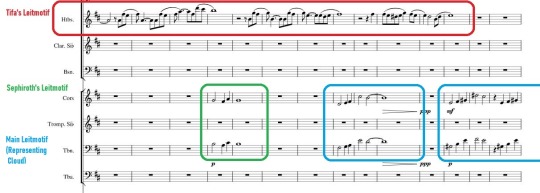
In contrast to the unstable, minor synth and strings of Who Am I?, the main leitmotif – Cloud’s voice in major – is now on sure ground. And in an almost cheeky playfulness, it starts its first subphrase, stops halfway, and then restarts a tone higher with a series of accidentals; more triumphant, more glorious, more free (image below). (Accidentals are chromatic notes foreign to the key, giving off tension against and breaking through the key’s constraints.) It is as if Cloud, stepping into hero status, begins as ‘Soldier Cloud’ would – following the pattern of his once-idol Sephiroth – only to immediately stop and go, “Hey, wait, he’s gone. It’s finished, he’s gone!” He backtracks and starts again, realizing himself different from that hero he’d dreamed of being in Sephiroth’s shadow; a hero in his own wholly free of any and all his influence.
This restart of the main leitmotif kicks off on a low E note, synchronizing with the ending high E note of Tifa’s. It is a merging of the two character voices – an effectual becoming of one. It is then that the main leitmotif takes the forefront, Tifa’s effectively being drawn up into it, as the pair turn to meet the rest of their friends.
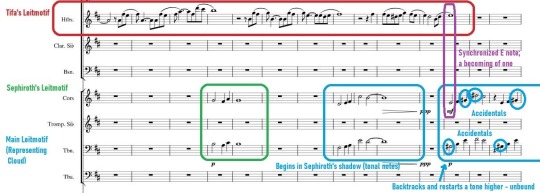
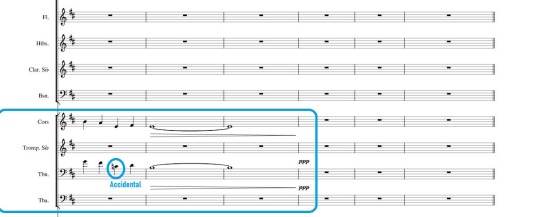
youtube
What is also interesting is the instrument combination. I mentioned earlier that the oboe is a relative neighbor of the flute. The English horn (cor anglais) is not actually a ‘horn’ – in terms of being a brass instrument (like, for instance, the French horn). The cor anglais is in fact a double-reed woodwind instrument of the oboe family. It is played in the same manner as the oboe, but differs in that it is bigger (giving it a lower pitch range), and has a rounder bottom (giving it a more reverberation). It is these two very related instruments that sync on that grand E note, in which Tifa’s voice is drawn up into Cloud’s. Meanwhile the trombone is the perfect voice for Cloud’s triumph as Tifa’s hero – no class more fitting than the brass to grandly express victory.
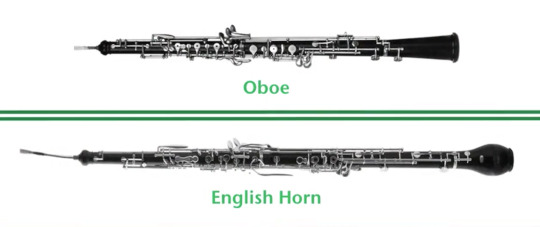
Cloud and Tifa are not the first Final Fantasy couple to have their leitmotifs overlap together. Final Fantasy VI’s ending track, Balance is Restored, introduces Celes’ leitmotif on an oboe. Then, transitioning into strings, Locke’s leitmotif simultaneously enters on… guess what? The English horn. Of course, there are many differences between Cloud & Tifa’s and Locke & Celes’ music synchrony, but I just love that little parallel.
youtube
To wrap up in summary the use of Tifa’s music in the original game (ie. Posts I-IV):
The intro of Tifa’s Theme (Post I) established Tifa as embodying home. In juxtaposing viewpoint – Tifa’s own viewpoint – were her locked-away burdens. Here we examined how the music sets up that Tifa: holds a profound motherliness toward others which outweighs thought for herself; strives to keep herself distracted from the insecurities of having to deal with her emotions; and embodies home for everyone else despite her own life being plagued by suffering.
Climaxing on the dominant chord (Post II), her conflictions were forefronted, and we were taken from the viewpoint of those to whom Tifa is home, into Tifa’s secret world of suffering. Here we saw the conveyances of Tifa being burdened by her: longings to confront Cloud with the truth; uncertainties of what the truth is; fears of losing Cloud should she take action; and doubts toward the validities of her own memories.
The leitmotif (Post III) revealed to us her drive, rock, reason, hope and the heart of her conflictions – Cloud – through its expression as: a theme of love; a clash against the always-home harmony; and a theme of perseverance.
Now that we have considered (to our efforts) the full picture, there is one final thing to point out. And that is the foreshadowing of arc closure in Tifa’s Theme itself – how Tifa’s character and journey, right down to the music, finds completion in her oneness with Cloud.
What I mean is that Tifa’s own theme track is, on its own, incomplete. Remember our observation in Post III that the leitmotif ends on and eternally loops from the dominant chord (our tension highpoint)?
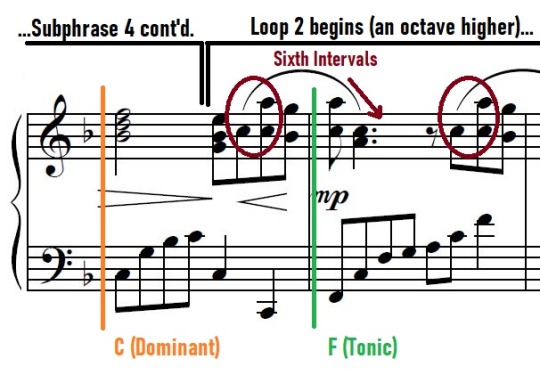
And that the final note is a held G – a tone below the A the melody was trying to reach the whole time?

Tifa’s Theme ends in the highpoint of her conflictions which, despite consistent perseverance, could not be overcome through her strength alone. This ending note – a fall-short with Tifa’s greatest efforts – at last finds resolution in The Planet’s Crisis with the synchronizing support of Cloud’s victorious lift.
Tifa’s leitmotif seeks resolution, lest it loops and loops and loops, until The Planet’s Crisis at last sees it taken up into the main. It is an ending, and it is a new beginning, of a new life together. A life where, as is vice versa, Tifa finds completion in Cloud.

That brings us to the end of the original game. But we have one more post left, where we’ll observe Tifa’s leitmotif throughout the FFVII compilation. Seeing Rebirth is just months away, I will likely post it after its release. In the meantime, thanks for journeying with me here. If you enjoyed, please follow my blog as I will be posting more deep dives on Final Fantasy VII, anime and other stories.
#final fantasy#final fantasy vii#final fantasy 7#ffvii#ff7#advent children#nobuo uematsu#tifa lockhart#cloud strife#sephiroth#avalanche#cloud x tifa#cloti#character analysis#music analysis#my deep dives
24 notes
·
View notes
Text
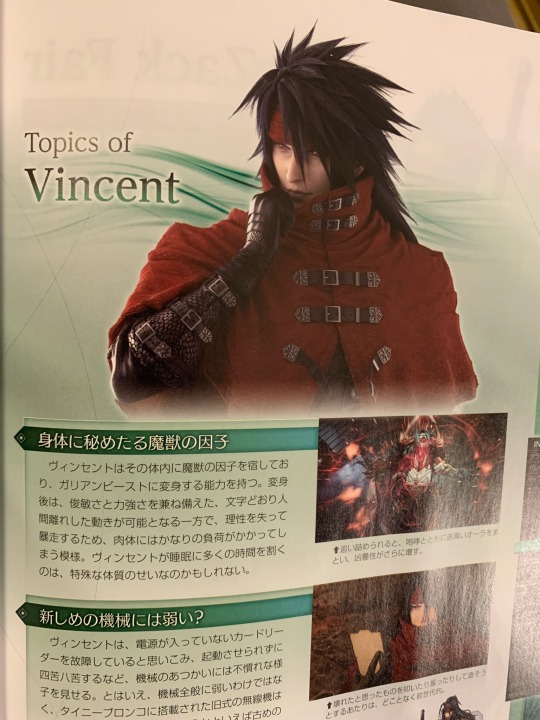
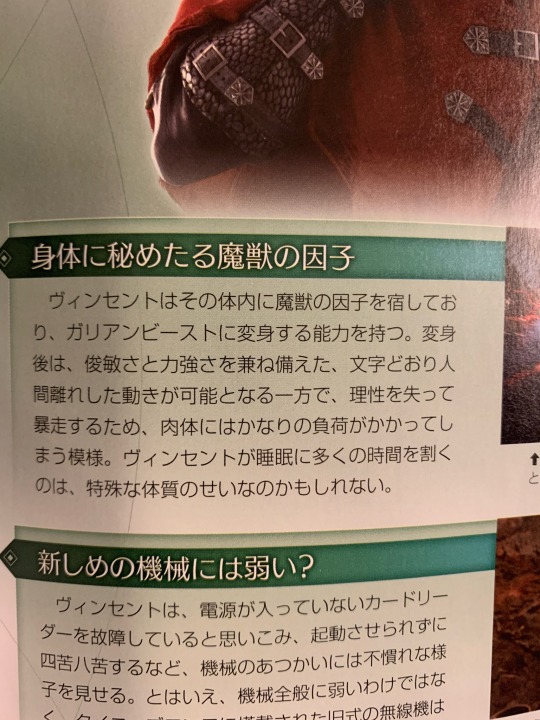
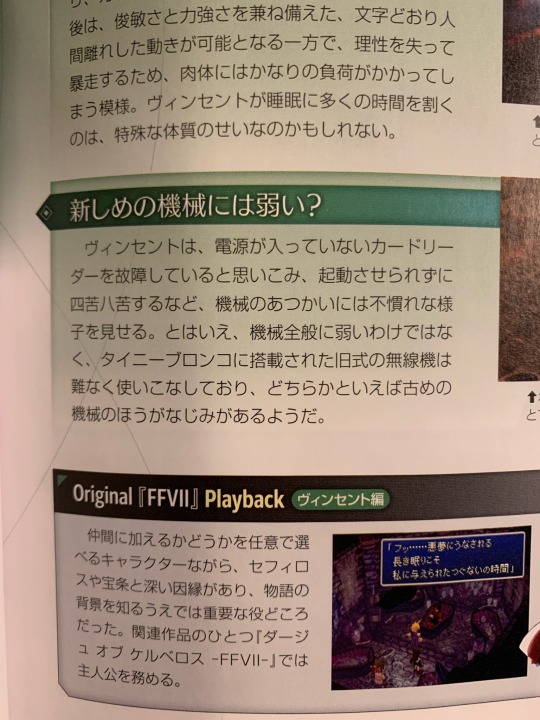
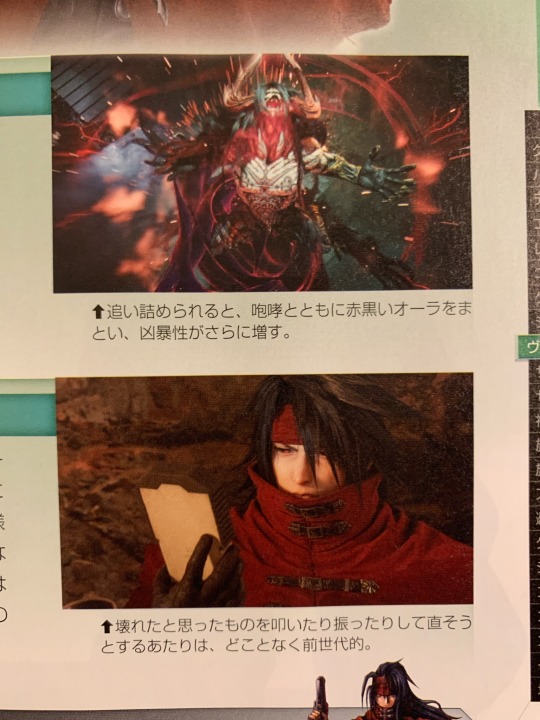
Topics of Vincent
(Your resident translator was on a plane and had plenty of time to do some work so here we go with the second page of his profile ❤️)
This is long so content is under the cut
1) 身体に秘めたる魔獣の因子
The factor of the magical beasts hidden in his body
ヴィンセントはその体内に魔獣の因子を宿しており、ガリアンビーストに変身する能力を持つ。変身後は、俊敏さと力強さを兼ね備えた、文字どおり人間離れした動きが可能となる一方で、理性を失って暴走するため、肉体にはかなりの負荷がかかってしまう模様。ヴィンセントが睡眠に多くの時間を割くのは、特殊な体質のせいなのかもしれない。
Because of the factor that Vincent houses magical beasts within his body, he has the ability to transform into Galian Beast. After transforming, he gains the ability to move with both speed and strength that is literally superhuman. At the same time, his rational mind gives way to wild rampaging, and it seems to take quite a toll on his body. The fact that Vincent spares a lot of time sleeping may be due to the peculiar nature of his physical make-up.
2) 新しめの機械には弱い?
Is he bad with new technology?
ヴィンセントは、電源が入っていないカードリーダーを故障していると思い込み、起動させられずに四苦八苦*するなど、機械のあつかいには不慣れな様子を見せる。とはいえ、機械全般にわけではなく、タイニーブロンコに搭載された旧式の無線機は難なく使いこなしており、どちらかといえば古めの機械のほうがなじみがあるようだ。
Vincent has the mistaken impression that the card reader doesn’t work as it’s lacking a power source, and the device not activating seems to cause him all manner of distress*. [Please see the footnote this phrase is amazing] It seems he is inexperienced with handling such devices. Even so, it doesn’t mean he is generally bad with all technology per se, as he was able to easily handle the wireless radio on the Tiny Bronco. That is to say, he seems to be more familiar with older machines.
(*I just want to talk about this phrase 四苦八苦. It almost sent me into hysterics. It’s pronounced “shikuhakku” and it means great distress, but literally translates to “four and eight kinds of suffering.” It’s another idiomatic expression with Buddhist roots that refers to “birth, old age, disease, death, parting from loved ones, meeting disliked ones, not getting what one seeks,” and so on. Basically a summary of his life so far, minus the old age. But the fact that they used this term specifically to talk about his distress at newfangled technology just sent me. Literally you can read this as “modern technology causes him four and eight kinds of suffering.” Like the rest of what he’s gone through isn’t 四苦八苦? But the card reader not working is. I’m dead ya’ll. Like. Vincent needs this on a shirt. I need this on a shirt.)
3) Original VII Playback (Vincent Summary)
仲間に加えるかどうかを任意で選べるキャラクターながら、セフィロスや宝条と深い因縁があり、物語の背景を知るうえでは重要な役どころだった。関連作品のひとつ「Dirge of Cerberus -FFVII-」では主人公を務める。
The player can choose whether to befriend Vincent as he is an optional character. Since he has a deep connection to Sephiroth and Hojo, viewed in the context of the game’s background story, the role he plays is essential. He takes on the role of the main character in the related game, Dirge of Cerberus.
「フ… 悪夢にうなされる長き眠りこそ
私に与えられたつぐないの時間」
“Hmph… my long, nightmare-laden sleep has given me time to atone…”
(Picture captions)
追い詰められると、咆哮とともに赤黒いオーラをまとい、凶暴性さらに増す。
When pushed to the wall, with a loud roar, clad in a dark red aura, his savage nature increases further.
壊れた思ったものを叩いたり振ったりして直そうとするあたりは、どことなく前世代的。
When he tries to fix something he thought was broken by hitting and shaking it, somehow it seems like he’s from another generation.
#vincent valentine#ffvii rebirth#ffvii rebirth spoilers#translations#ffvii rebirth ultimania#enjoy!!!
182 notes
·
View notes
Note
(Prt. 6) Came back after a few hours and saw your post. Enjoy your weed. XD I hope it's okay if I continue my ramblings (kinda forgot where I left off). Anyhow, one of the things that also really struck me about AC was showcasing the similarities and differences between Rufus and Cloud. They're strong, intelligent, and proud men that went through a lot after Meteorfall with geostigma and suffered a lot because of it. Rufus regrets his past actions and is always looking towards the future by AC.
In contrast, Cloud is stuck in the past and suffering from depression, unable to move forward due to his regrets. While Rufus is determined to stay alive while throwing off Kadaj in AC, Cloud has resigned himself to death. It takes a combination of Aerith, Tifa, Marlene, and even Vincent to finally push him forward to take action after avoiding everyone for so long. Cloud's and Rufus's respective struggles in AC are foils to each other, while serving as the biggest obstacles to Kadaj.
As mentioned before, I thought it interesting to be that in AC, Rufus was the person Cloud used as an excuse to run from his issues that led me thinking about their dynamic and characterizations. It made realize (and later confirmed in the Ultimania Omega) that at the end of the day, Rufus and Cloud never truly hated each other, even back in the OG. Sure, Rufus was a total cliché villain in the OG, but it had more to due with differing goals and philosophies that Rufus did grew out of.
I think I'd mentioned this briefly in one of my previous posts, but I really like that Rufus can understand Cloud enough to try and draw him into a partnership with honeyed words, which almost worked if not for Reno's mouth (lol), and Cloud knows Rufus enough that he isn't telling him the whole truth and calls him out on it. Honestly, their blunt interactions were so REFRESHING to see because they can say what's on their minds without tiptoeing around each other in AC.
And it's precisely because of that bluntness between them, as well as their similarities/differences, is what I think Rufus and Cloud would actually make a good couple. I know it'll never happen and it's just an overall opinion, but I don't think what Cloud needs people is always coddling him and not being able to speak their minds until something bad happens. Same thing with Rufus because he doesn't need a yes-men enabling his bad decisions/habits.
I'll end it here because it's past midnight in my timezone, but here have two strong, prideful men who hide their insecurities and loneliness though stoicism and going through severe inferiority-superiority complexes through the FFVII titles. It's a dynamic that works because they see each other as equals and worthy opponents and good allies. I strongly believe they complement each other as a result all of that and can find solace and a tender intimacy if they overcome their issues.
My response under the cut:
Yes yes yes, exactly this stuff. The distinct scene between Cloud and Vincent, specifically, about Vincent having never tried to forgive himself...I'm sure Cloud has this moment where he feels he's looking into his future if he doesn't shape up. It really is this whole story about how everyone around him is acting, and he's frightened into paralysis again. It's understandable, because Remake/Rebirth Cloud aside...he's fucking terrified of himself in the original. He did some horrible things (because of the Jenova/Seph influence), and then failed to do some very heroic things (by his own definition, at least). But the reality had to strike him, eventually, that...even fucking Shinra is trying to figure out what Geostigma is and how to stop it. Like...this is the new world. The Planet hasn't rejected them, it's just still getting FUCKED by Jenova. It was interesting and, ultimately, necessary character development for the Turks and Shinra Co. to evolve. It would make Rufus seem kind of like a short-sighted moron if the world practically ended because of the empire his father built, and then...he just repeats the same actions??? Nah. It wouldn't make sense and it would make them all really flat, I think. They would kinda cease to be characters and remain plot devices for Cloud's story. Which they definitely aren't!!
I don't want to give Cloud's friends too much shit. They have the very difficult task of getting that boy off his ass and out of his head. They're constantly relying on him, pushing him to Do Stuff, and I can see from his perspective how that would just be so crushing and anxiety inducing at times. Which honestly makes it that much more tantalizing that Rufus lured him in the way he did...with sugary speech and a yes/no proposition (as opposed to a guilt-trip, lbr).
I think in Cloud's case it's a lot more complex than simple coddling, but I know what you mean. I think Shinra Sr. had more of a 'yes-men' problem than Rufus, at least inasmuch his people never even TRIED to stop him from doing LITERALLY everything he wanted. I suspect the Turks could speak to Rufus more plainly than any of Shinra Sr.'s lackeys could speak to him (hence the dressing down Rufus gives them about dropping the plate in Rebirth). Or, maybe the Turks would just complain to Tseng and make Tseng go talk to Rufus XD idk.
At any rate, I do mostly agree with you, I just can never go so far as to say who would be the 'best' for one another (I really do think all characters have different interesting dynamics to bring to the table and I love too many different ships). But I respect your analysis and I ship tf out of them so I wouldn't be anything other than tickled by them being together in some capacity. I'd love for my poor country boy to have a wealthy bf who can pay off his student loans (wait...)
And I'm really happy you felt this was a safe space to share all this because fandom really needs that! I'm flattered. I hope people continue to feel that way. I'll be honest about my feelings but I'm never here to judge anyone. 💞
#stanswers#Anonymous#ff7#ff7r#ff7 rebirth#ff7 rebirth spoilers#ff7r spoilers#final fantasy 7 rebirth#final fantasy 7 rebirth spoilers#final fantasy vii rebirth spoilers#rufus shinra#cloud strife#ruclo#strifra#rukura
5 notes
·
View notes
Text
A Clinical Analysis of Cloud's Psychology, Part I - Trauma, Dissociation, and Psychosis
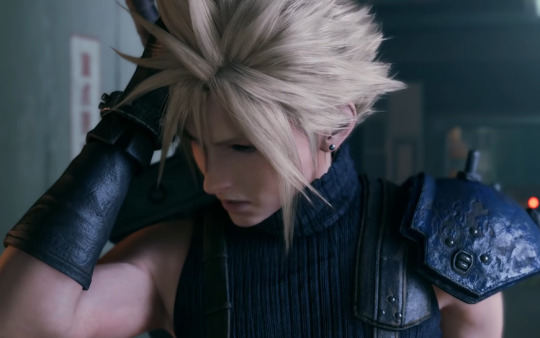
This analysis was originally posted on Reddit, but I decided I wanted to archive it on this old blog too. This topic's been beaten to death already, but in light of the 25th anniversary stream and Rebirth trailer, I want to release my own take on Cloud's psychology using the lens of professional psychology. I'll cover a range of humanistic concepts and criteria from the DSM-5 (basically the bible of clinical psychiatric diagnosis) and tie them in with the lore of FFVII. Although the reasons for Cloud's identity crisis are well-known among OG fans, I'm interested in breaking down exactly why and how those factors resulted in his fabricated ex-SOLDIER persona within the context of real world psychology. I'm going to look into three main areas of exploration: trauma, identity, and reintegration. These areas will conceptualize how Cloud's experiences opened the gateway to pathology, how his understanding of himself is built and then shattered, and how the pieces come back together. This first post will cover the trauma piece, including the topics of dissociation and clinical diagnosis.
Part I - Trauma, Dissociation, and Psychosis [you are here]
Part II - Identity, Self-Concept, and Mako
Part III - Reintegration and Unconditional Love
One of the most common misperceptions about trauma is that any adverse experience will cause it. While it's true that adversity can cause stress, this belief undermines the remarkable resilience that humans have. The most important thing to consider is that everyone has resilience and the capacity for coping, but this differs from person to person. In the clinical context, traumatic experiences are defined as frightening, dangerous, or violent experiences that elicit strong emotions and physical reactions. People can also experience trauma by witnessing an event that threatens the life or physical security of a loved one (i.e. watching a parent die). When the stressfulness of a traumatic event exceeds a person's ability to cope, the stress becomes pathological and can be classified as trauma. The tragedy of Cloud's life is that his traumatic experiences are deeply stressful and essentially occurred back to back. Each event ticks off multiple boxes for the likelihood of trauma, and then Cloud essentially experienced them in succession, if we assume that his sense of time in Hojo's laboratory was warped due to catatonia.
Dissociation
Different people have different reactions to the same traumatic experiences, and the ex-SOLDIER persona is a unique one. Although we know Cloud's ex-SOLDIER persona is his primary consequence, there's a clinical way to contextualize what purpose it serves. Cloud's headaches are used as a constant indicator that something isn't right with him. His headaches are even described in the FFVII Remake Ultimania within his character profile (translation provided by aitaikimochi):
Cloud suffers from sudden headaches that last for brief moments. This pain is usually accompanied by flashes of his childhood, his fated opponent Sephiroth, or pieces of his past. There are times when visions of the future get mixed up as well. His headaches are filled with mysteries. Perhaps there might be more than one cause of these headaches that plague him...?
Aside from serving as narrative hints, the headaches are also connected to experiences of dissociation. Dissociation is a common consequence of trauma that center around a detachment from reality as a defense mechanism. It has numerous features, some of which open the gateway to psychosis. Let's focus on the specific features that are integrated into Cloud's story.
Memory
Memory is the largest piece of Cloud's dissociation since his ex-SOLDIER persona requires him to ignore key memories. At the start of FFVII, Cloud experienced problems with remembering anything between the Nibelheim incident and his arrival in Midgar. You could argue that Cloud has selective retrograde amnesia, but his memory between the time he left Nibelheim to join SOLDIER and the Nibelheim incident is deeply distorted, rather than unclear or largely missing. This hints to us that Cloud's memory problems are a function of dissociation, which is commonly invoked in trauma victims to protect them from memories of their traumatic experiences. Cloud's case is more complex though, since he also experiences identity problems. Even though sense of identity is also a feature of dissociation, we'll talk about it later in Part II.
Hearing voices
Hearing voices can be considered a part of dissociation when the voices are internal, or inside the head. It's when they are external and appear to be coming from outside the body that we begin to think of psychosis. This is where fantasy starts to blur how we can interpret Cloud's psychology. Cloud mainly hears two different types of voices during his journey: Sephiroth's voice, and his own voice. Cloud hears Sephiroth's voice taunting him from time to time, and it is an external voice. However, it's important to recognize that Sephiroth is a true external influence with his own agenda. Therefore, we can assume that it really is Sephiroth speaking to Cloud, not just a fabrication of Sephiroth in Cloud's head. We know this because when he experiences a headache, Sephiroth's voice often comes after. Basically, the more unstable Cloud's identity becomes, the more he mentally vulnerable he is and the more he hears Sephiroth's voice.
The other voice, Cloud's own voice, is internal. The problem is, sometimes it's tricky to tell whether it is functioning as dissociation or as a storytelling device. The key to understanding this is recognizing that this internal voice is meant to represent Cloud's real self. Cloud's identity crisis is the core of his pathology and is portrayed as a suppression of his real self. The times when he does hear his real self appear to be moments of clarity. In this case, the voice of Cloud's real self is understood as a sign of deconstructed identity; this voice is a manifestation of dissociation.
Intense Flashbacks
Intense flashbacks are another common feature of dissociation. Again, our perception of this concept in Cloud is somewhat unclear due to the fact that flashbacks are also a storytelling mechanism. However, we can use Cloud's headaches as an indicator of whether he is recalling a memory voluntarily or involuntarily. Cloud's involuntary flashbacks are shown to be disruptive and disorienting. They will initiate sometimes due to triggers in the environment, but might also occur out of the blue. Again, these flashbacks largely tie back to Cloud's identity crisis, so it's safe to say that this is another feature of his dissociation.
Reality Testing
Reality testing refers to a person's ability to understand and distinguish the external and internal world, or reality and fantasy. When someone has problems with reality testing, he experiences hallucinations. For the most part, Cloud is able to grasp his reality and navigate the environment just fine. It's either when something in the environment triggers Cloud's memories or when Sephiroth reaches out to him that he experiences intense hallucinations, which are indeed moments of dissociation. Again though, it's sometimes hard to tell if these are fabrications of Cloud's mind or if they are purposeful illusions created by Sephiroth, especially since other party members can sometimes see Sephiroth as well. But, even though there are moments where Cloud seems to have trouble distinguishing reality from his imagination, these moments are better explained by Sephiroth's influence. Therefore, I wouldn't say that Cloud's hallucinations are a sign of psychosis.
The other complicated piece here is the knowledge that the existence of Cloud's ex-SOLDIER persona is an inherent rejection of reality. Essentially, the ex-SOLDIER persona is like a delusion, a fixed belief that is resistant to change even with the presence of conflicting evidence. Cloud has to reject the reality of who he is, what happened to him, and Zack's existence in order to keep himself grounded. This is maybe subject to change now in Rebirth, but as far as the original story goes, Cloud begins to doubt himself once he is told that his memories actually belong to another person he can't remember. So, should we still talk about psychosis?
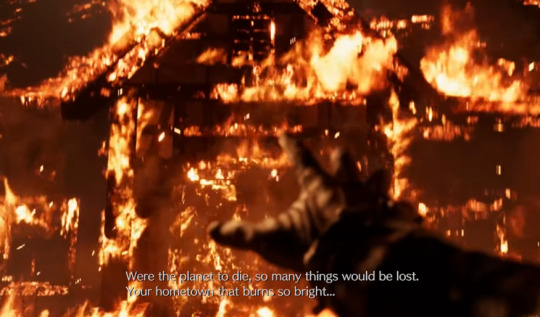
Real World Disorders
Before we proceed, a disclaimer. I do have professional training in clinical diagnosis and psychotherapy, but ultimately I'm still playing armchair psychologist. This is just my personal take on Cloud's psychology.
When I talk about psychosis, this refers to a remarkable loss of contact with reality (see the NIH). Psychotic episodes can involved disturbed thoughts and difficulty with understanding what is real and what is not. It seems appropriate to discuss psychosis in Cloud's case given that his dissociation does make us question his understanding of reality around him, including what he remembers.
One of the most common things that I've seen people speculate is Dissociative Identity Disorder (DID) due to the implication of the ex-SOLDIER persona as a distinct personality. DID was formerly called Multiple Personalities Disorder, and it's pretty much what it sounds like. The key feature of DID is the presence of two or more distinct personalities that alternate in the conscious. Most of the the time, each personality (or alter, as it's often called) is unaware of what the others are doing when they have control of the conscious. See Marvel's Moon Knight for an excellent recent portrayal of DID. There's a lot of dispute about what causes DID, but the general consensus is that DID results from the combination of childhood trauma, mostly abuse or neglect. To best explain it: "in DID, traumatic memories are decontextualized and processed to retain internal and external balance, which leads to formation of alter personality states each with a sense self and agency, personal history, and a mission" (Şar, 2014).
Despite this, I'd argue we cannot say that Cloud has DID as we understand it in the real world for several reasons. The most important aspect is that Cloud doesn't consistently switch between his ex-SOLDIER persona and his real self - in fact, his real self rarely if ever comes out explicitly. Rather, it looks like as long as the ex-SOLDIER exists, the real self is suppressed. This specifically tells us that Cloud's experiencing an identity issue. Furthermore, people with DID present remarkable problems with reality testing regardless of external influences. The times that Cloud sees and hears Sephiroth are arguably still partly hallucinations, but we already established that Sephiroth is deliberately messing with Cloud's sense of reality and identity in some form. He's purposefully taunting Cloud, especially when others cannot see him. We know that Sephiroth is literally reaching out to Cloud, that this isn't all happening inside Cloud's head. Therefore, Cloud's hallucinations are likely not a sign of psychosis, and it's unclear if we can even call them hallucinations in the first place.
If I had to give an armchair DSM-5 diagnosis to Cloud, I would suggest that he has Delusional Disorder. This disorder shares some features with Schizophrenia, but does not include hallucination as a symptom. More importantly, delusional disorder doesn't feature "bizarre or odd behavior" that's often seen in other psychotic disorders. Outwardly, people with delusional disorder don't appear delusional unless the subject of the delusion is involved. I do still hesitate with this diagnosis though, mainly because Cloud ultimately does respond to information that challenges his delusion. The DSM-V does specify that "individuals with delusional disorder may be able to factually describe that others view their beliefs as irrational but are unable to accept this themselves." When Cloud is explicitly confronted with information that is inconsistent with his delusion, this in fact opens the gate for Sephiroth to convince him that he is essentially not real. If he had delusional disorder, Cloud would have continued to reject reality.
The fact of the matter is that Cloud's ex-SOLDIER persona cannot be fully understood in the context of real world psychosis. The fantasy elements of FFVII complicate diagnosis, especially considering when and how the ex-SOLDIER persona was born. Plus, I wouldn't pathologize Cloud this far given that I don't think real world psychosis best explains what happens to him. While Cloud's ex-SOLDIER persona appears to be a delusion, it doesn't present negative consequences unless he's presented with conflicting information and is vulnerable to change when challenged. Essentially, we can partly understand the ex-SOLDIER persona as an ongoing dissociation that serves to protect Cloud from the memories of traumatic experiences. But, I wouldn't go so far as to give him a DSM-5 diagnosis.
Basically, we can't fully conceptualize Cloud within the realm of psychosis or personality disorders. Rather, his dilemma revolves around the deconstruction of his identity, which I'll discuss in my next post.
Edit 10/12/22: Clarified that psychosis refers to a loss of contact with reality, not a disconnect from reality (which is dissociation).
#final fantasy#final fantasy 7#final fantasy vii#ff7#ffvii#final fantasy vii remake#final fantasy 7 rebirth#ff7r#ff7 remake#ff7 rebirth#ffvii rebirth#cloud strife#sephiroth
95 notes
·
View notes
Text
My brain wants to torture Cloud :(
First of all, for this whole thing to make sense, keep three things in mind:
1. The information from the FFVII Remake Ultimania book, which practically confirms the theory that Zack and Cloud are living on different timelines after the end of the game;
2. Consider that Sephiroth is from the future, after his defeat at the end of Advent Children (hence the black wing);
3. Remember the new FFVII Rebirth trailers, in which Sephiroth says some very interesting thngs.
So, here it goes.
At the start of FFVII Remake chapter 2, Cloud has a vision of Sephiroth and what appears to be a Nibelheim flashback. It's one of the first indicatives of his presence this early in the game, at least in Cloud's mind. He starts to mess with him way earlier than he should, and leads him down an alley to say cryptic bs. What are his exact words, though?
"Run, Cloud. You have to leave. You have to live."
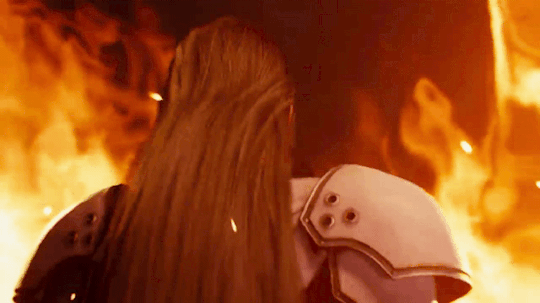
Run away. Get away from his current path. Why? So that Cloud doesn't meet Aerith. After coming back, Sephiroth's first attempt at messing with time is to prevent Aerith from joining the party and thus not having her interfere with his plan.
Thanks to the Whispers it doesn't work. They keep her in place and go out of their way to make it conspicuous so that it gets Cloud's attention.
This is where Sephiroth learns that the Planet has a defense mechanism to prevent deviations from happening in the timeline.
Throughout the game, we see the Whispers trying to do their job and keeping the events as they were supposed to happen in the OG game, and we see that our characters are not happy with them. They're aggressive, they get in the way, and they have no qualms about hurting people in order to get what they want.
We also learn, at the end of the game, that Sephiroth is in control of the Whispers, and can use them as he pleases to screw with time (it's the whole reason the Singularity even happens). And what does he use them for? Bait. He knows they've been annoying to us the whole game, and knows Cloud and the others would jump at the idea of getting rid of them.
But why would he do that? Why would he give up such a power? Simple: to give our main characters the illusion of control. To make them think they're walking their own path and build up hope, only to take it away at a later time.
Remember this?
"Tell me what you love. Give me the pleasure of taking it away."
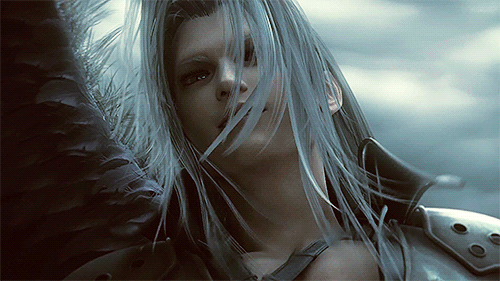
Sephiroth is a manipulator. Always has been, always will be. And his primary target is Cloud. His whole mission in the OG is to break Cloud's mind and use him as a puppet to achieve his Reunion. The thing is, this isn't OG Sephiroth anymore. It's Advent Children Sephiroth, with all the knowledge of the past and the circumstances of his defeat. He knows why he lost and has a brand new plan for his new Reunion: To merge the timelines.
And this leads to the main question.
What if Zack surviving wasn't an accident? What if it was planned?
As he creates the Singularity, Sephiroth shows our main characters a vision of the past. Specifically of Zack charging into battle at the end of Crisis Core. Why would he do that? To screw with Cloud. To jostle Cloud's memory of Zack and make him remember him earlier (also shown in a Rebirth teaser trailer). Why? Because remembering Zack is what ultimately breaks Cloud's SOLDIER persona.
Sephiroth has broken Cloud's SOLDER persona before, thinking it would be enough to make him a puppet, but that plan failed thanks to Tifa bringing back the real Could. And knowing this, he won't repeat his mistake. He won't aim for the fake, he'll aim for the real thing. But for that to happen, he needs to get rid of the SOLDER persona first. Being inside Cloud's head, Sephiroth knows Cloud's Mako-soaked brain is struggling to remember who he is, and he also knows the persona creates inconsistencies between Cloud's and Tifa's memories. So he encourages them, throws them at his face (also seen in a teaser) to make him doubt himself and everyone around him. To weaken the SOLDIER and get closer to the real Cloud.
And that is why he keeps Zack alive at the end of FVII Remake.
Remember the Whispers hanging around at the cliff? If by that time Sephiroth is in control of them and can use them as he pleases, if he's making them converge at Midgar to pull together a frickin' cataclysmic event, then why the hell would they be all the way out there?

They're not there to make sure Zack dies. They're there to make sure he survives. Zack himself is confused by it, he doesn't see the Whispers, but he does comment on the lack of troopers, on how there should be more. Of course, Zack doesn't know what's going on and just wants to get himself and Cloud the hell away from there, so he just takes the win and bolts.
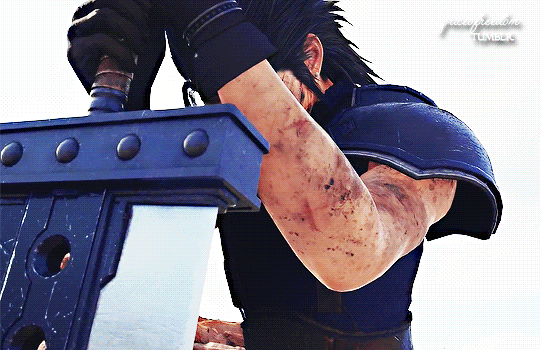
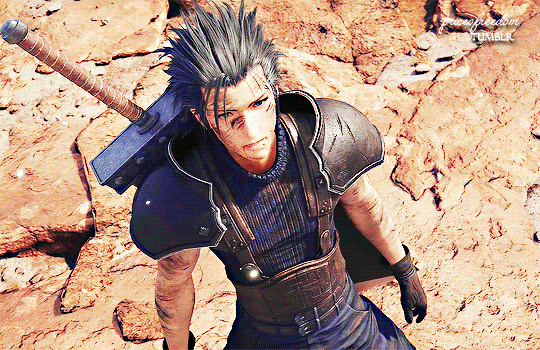
But now, Sephiroth can use him as a weapon against Cloud. As a being outside of time, he can send Cloud images of Zack alive to confuse him, to nudge his memories and make him remember who he really is so that he can break the SOLDIER persona. That's why he wants the timelines to merge, so that he can expose the real Cloud and work on breaking him instead.
So there you have it. My sleep-deprivated and over-caffeinated brain musings. Hope you had fun. And if you know anyone who has a similar theory, let me know. I would love to read about it.
See ya around. Here's a cookie for making it this far. 🍪
6 notes
·
View notes
Text
FFVII Rebirth Ultimania:
Nojima says this is an ultimate favorite scene of his
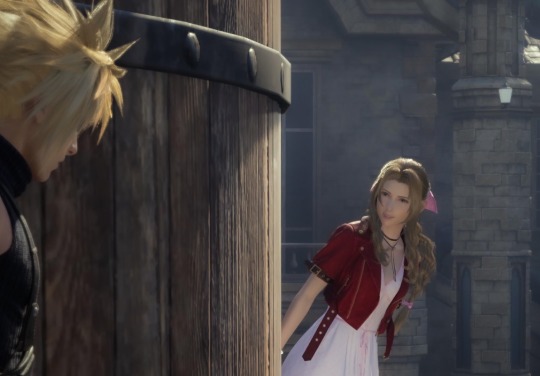
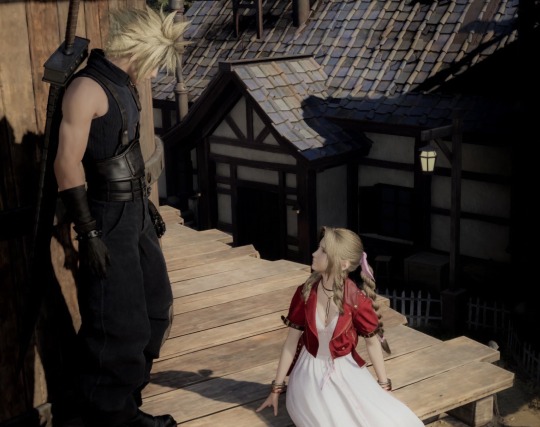
Square Enix gave Cloud & Aerith their own water-tower moment
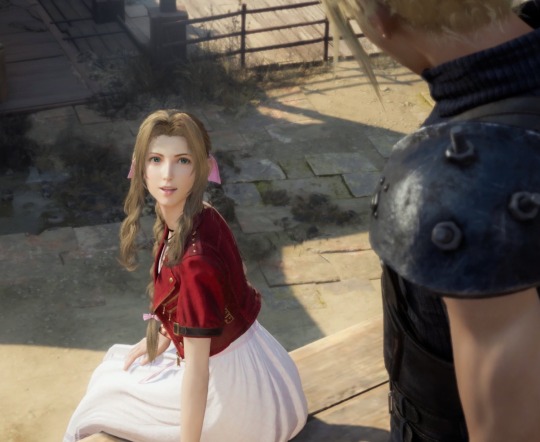
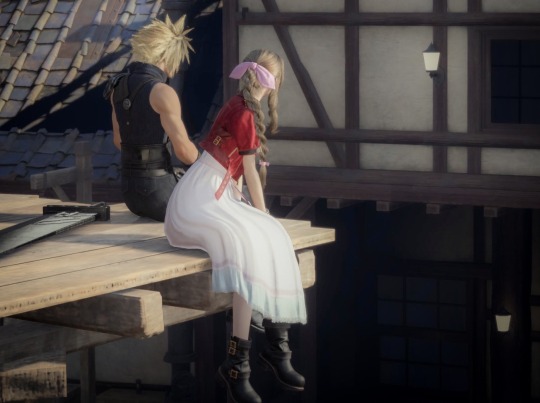
69 notes
·
View notes